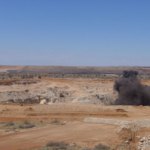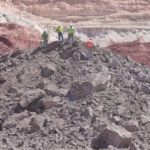First train arrives at Tshipi Borwa
Tshipi Borwa, our new manganese mine in South Africa’s Northern Cape, has reached another milestone. The first train has arrived at the mine and is now being loaded with the mine’s first shipment of manganese destined for the Far East.
Tshipi é Ntle’s Tshipi Borwa mine’s first manganese ore.
Tshipi é Ntle’s Tshipi Borwa mine in South Africa’s Northern Cape has mined its first manganese ore.
It took 11 months of continuous 24 hour-a-day operations to shift the waste rock overlaying Tshipi’s ore resources. Tshipi blasted its first ore on the 10 October, several weeks earlier than planned. Ore loading commenced within hours.
Justin Pitt, managing director of Safika Resources, said “We are very pleased with the progress of Tshipi to date and we are now stockpiling the manganese to be loaded on to the first train that will leave the mine for Port Elizabeth in November. From there it will be shipped to the Far East in December.”
Saki Macozoma has been honoured by UNISA
Safika’s non-executive chairman Saki Macozoma has been honoured by the
University of South Africa (UNISA) which has made him and former president Nelson
Mandela joint recipients of the university’s first Robben Island alumnus award. The
award, part of the Calabash awards that are UNISA’s highest honours, is to honour
those who were imprisoned by the apartheid regime because they fought against the
system of State oppression.
Professor Mandla Makhanya, UNISA’s principal and vice chancellor said that the
award was given to Mr Macozoma: “in recognition of the significant role you played
in the liberation of our country, in the development of our economy as a pioneering
business leader and in the development of our higher education system.”
Saki is Chairman of the Council on Higher Education, chairman of the University
Council of the University of the Witwatersrand and a member of the Board of
Governors of Rhodes University.
Safika’s chief executive Moss Ngoasheng is interviewed in Africa Straight Up
[youtube]qKUVfcXB14w[/youtube]
Tshipi’s new rail siding gets a place in the history books
JOHANNESBURG (miningweekly.com) – Transnet is compiling the first-ever distributed power train for manganese, made up of 208 wagons.
The train will be loaded at the newly completed rail siding of black-controlled emerging manganese miner Tshipi é Ntle’s new project, near Kathu, in the Northern Cape.
“It’s the train of the future,” Tshipi é Ntle CEO Finn Behnken told Mining Weekly Online on the sidelines of last week’s Metal Bulletin Events’ fifth Ferro-Alloy conference in Johannesburg.
Transnet Freight Rail has opted to compile the train to increase the volumes of manganese exports from Port Elizabeth and ultimately Coega.
“That train will be compiled at our railway siding,” said Behnken.
Struggle veteran Saki Macozoma is chairperson of Tshipi é Ntle, in which the black economically empowered Ntsimbintle Mining owns 50.1% and the ASX-listed and Pallinghurst-linked Jupiter Mines owns 49.9%. Pallinghurst is headed by mining luminary Brian Gilbertson.
The distributed power train makes use of the same technology that Transnet deploys down the iron-ore railway line from Sishen to Saldanha, on which 342-wagon trains travel.
Typically, the trains on the manganese general freight line to Port Elizabeth have been shorter, predominantly consisting of 104 wagons.
Transnet is poised to do the once-off trial run with a train made up of two 104-wagon sets with locomotives at the front and rear.
The locomotives communicate by radio signal with one drive-control unit managing the power.
Although the long train will be loaded with ore, it will not be Tshipi’s ore, the first of which is only scheduled to be available from the company’s Tshipi Borwa openpit project towards the end of 2012.
This article was published on www.miningweekly.com.
View the article online at http://www.miningweekly.com/article.php?a_id=267962
Tshipi é Ntle Manganese Mining Wins Conservation Award
Tshipi é Ntle Manganese Mining (PTY) Ltd., a company in which Safika has a major stake has won a conservation award for its work in protecting endangered secretarybirds. Tshipi is creating a new manganese mine in a remote corner of the Northern Cape.
Tshipi won the Northern Cape Raptor Conservation Award for 2012 after it partnered with the Endangered Wildlife Trust to monitor the life and habits of a fledgling secretarybird. The secretarybird was fitted with a specially designed radio harness that allows scientists to monitor its movements as it travels around the Northern Cape.
“The award is given by the Northern Cape Raptor Conservation Forum to an organisation or person who has made an outstanding contribution to raptor conservation in the Northern Cape, said Beryl Wilson, a zoologist at the McGregor Museum in Kimberley, who is working on the project. “The award salutes the commitment to the environment shown by Tshipi é Ntle Manganese Mining. The work Tshipi has done sets a fine example to other mining companies, particularly because Tshipi demonstrated its commitment even before it began production. Tshipi’s work has paved the way for us to learn why secretary birds are in trouble.”
Sagittarius serpentarius, as scientists like to call the secretarybird, is one of South Africa’s most iconic creatures; a secretarybird is even featured on the country’s coat of arms. Secretarybirds were once a common sight stalking through the South African bush but their numbers are plummeting and this year has been listed as “near threatened” in South Africa and “globally vulnerable by the International Red Data List of Threatened Species.
Tshipi é Ntle is chaired by Safika’s chairman Saki Macozoma, Safika’s chief executive Moss Ngoasheng is a director of Tshipi. Former South African Brian Gilbertson’s Jupiter Mining is also a major shareholder. Macozoma said: “When I was told of the plight of the secretarybirds I immediately said this was a project we should support. The project has been a great success and is providing South African scientists with valuable information that will help us protect these vulnerable creatures. We are proud to be working with dedicated scientists and honoured that we have won this award.”
Nontokazi Mabuza, Tshipi’s health, safety, environment and community liaison officer, who accepted the award at a function in Kimberley on Monday (March 19) said: “From the very beginning Tshipi é Ntle was determined to be an environmentally responsible organisation. We started the secretarybird project at the same time we started construction on our new Tshipi Borwa mine near Hotazel in the Northern Cape. Our commitment is to create a profitable mine that will provide employment and economic benefits for the people of the Northern Cape for generations to come, to ensure that we help the human communities where the mine is situated and to help protect the environment whenever we can.”
Safika Holdings
Media center
- Safika Holdings associate Ntsimbintle Holdings agrees to landmark sale of its manganese portfolio to Exxaro Resources
- In remembrance of Justin Pitt
- Justin Pitt Dies, Safika Loses One Of Its Own.
- Safika chair appointed non-executive director of global packaging and paper group Mondi
- Macozoma’s Ntsimbintle has vehicle for manganese consolidation following Gilbertson ouster
Contact us
+27 11 483 0840
[email protected]
Safika House
First Floor
89 Central Street
Houghton
2198

